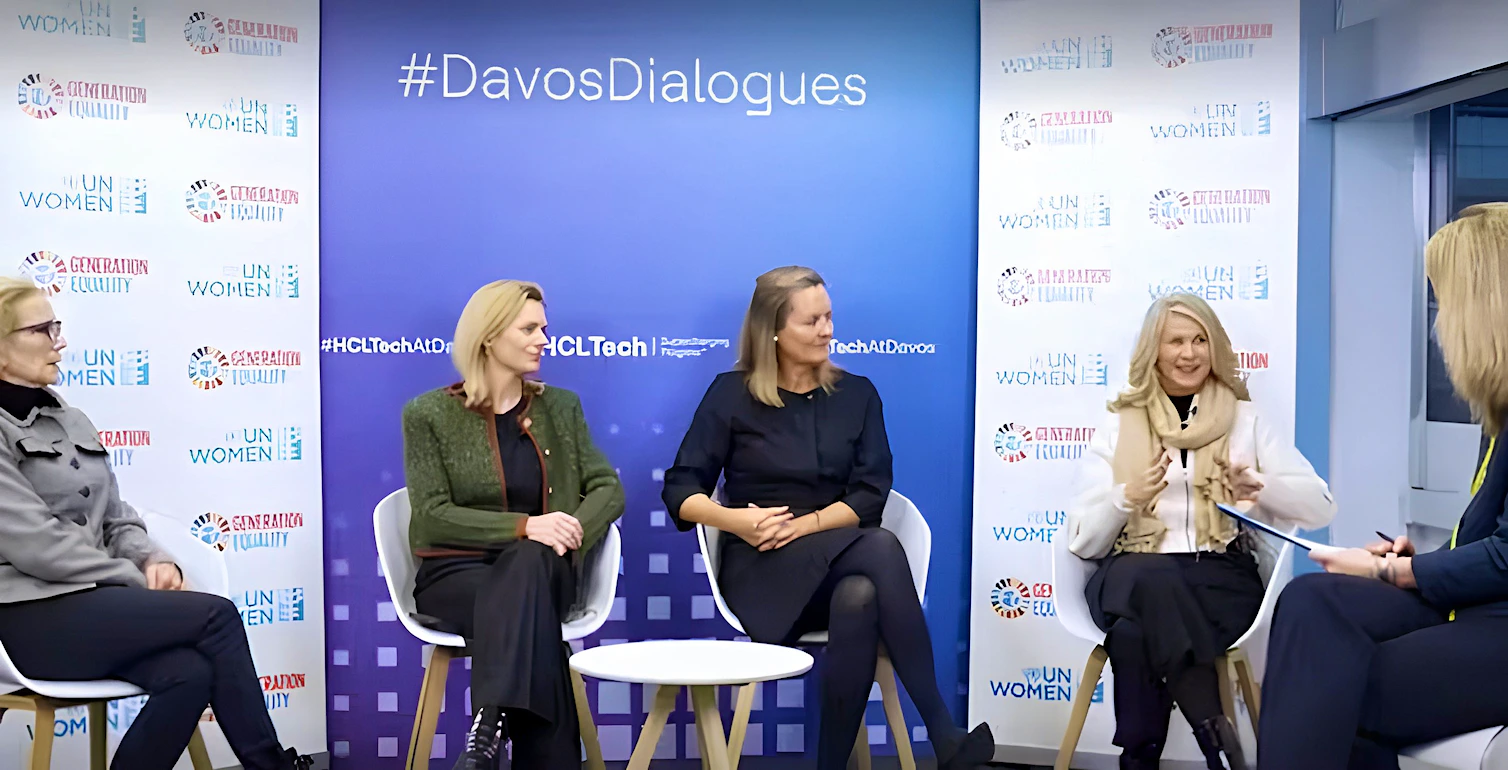Off the back of their long-standing relationship and involvement in the HeForShe initiative, HCLTech provided space in its pavilion for UN Women to host the first Gender Equality Hub at the World Economic Forum. The first panel discussed how technology and innovation can help level the playing field for women.
Gender inequality pervades almost every aspect of society, including the ever-expanding digital landscape.
Dr Sima Sami Bahous, Executive Director at UN Women, recognized this during a speech to the UN General Assembly last year, saying: “The digital divide has become the new face of gender inequality.”
The digital divide
Opening the panel, moderator Sarah Hendriks, Director of Policy and Programme at UN Women, said that “digital tech is rapidly transforming society, allowing for unprecedented growth and unprecedented opportunities for women and girls around the world”.
This has undeniably led to social, economic and political benefits. But the increasing presence of digital technology and platforms in our everyday lives has also presented “new challenges that might perpetuate and reinforce existing gender inequalities”, she continued.
This increasing digital divide is not going under the radar. The UN General Assembly has declared 2023 a year of action on innovation and technology for gender equality, which will “enable the world's governments to look at technology and innovation to see how the normative frameworks in the world can be advanced to support innovation and technology that works for everybody”, added Hendriks.
To succeed in these ambitions and ensure technology serves as a great equalizer that everybody can access, “public and private partnerships are critical,” according to Jill Kouri, Global Chief Marketing Officer at HCLTech, who participated in the panel.
As an example of this in action, another panelist, Asa Tamsons, Senior Vice President and Head of Business Area Technologies and New Businesses at Ericsson, referenced the company’s Connect to Learn program, which is trying to get affordable devices and access to connectivity at schools.
She said: “To date, we have connected 300,000 children, in partnership with service providers, NGOs like the United Nations, and public and private partnerships. Every investment in this area from the public and private side pays off.”
The blueprint to gender equality
The Gender Equality Forum, set up by UN Women, is an initiative that brings together public and private sector partners in a series of action coalitions, with one of those being on innovation and technology for gender equality.
Microsoft and Women@TheTable, two members of the coalition, also joined the panel at the HCLTech pavilion.
Commenting on Microsoft Philanthropies’ focus, Kate Behncken, Corporate Vice President, said: “We want to make sure that everybody gets access to digital skills...[with a focus] on underserved people and communities.
“If people can't access the internet, then they can't get digital skills. If they can't have digital skills, they don't know how to leverage the internet for education or other opportunities.”
She continued: “One of the advantages of the forum is that it helps us all come to the table and think about the unique strengths that we can bring to help address this issue.”
Caitlin Kraft-Buchman, Founder and CEO at Women@TheTable, then highlighted the forum’s blueprint for how technology and innovation can be used to foster gender equality at a global scale.
She said: “The blueprint has four pillars; access, ecosystem, innovation and online gender-based violence.”
- Access refers to access to the internet, devices and data.
Looking at this pillar in particular, Tamsons provided insights on why Ericsson is committed to improving access to digital and connectivity.
She said: “You need access to connectivity and devices, because that's the foundation. If you don't have that you're not included...[and] don't have the chance to build even basic digital skills.”
Tamsons continued: “We want to help to bridge the gap...[in the] interest of driving more inclusiveness.”
There’s also an economic incentive. “If we really want to have a prosperous world and continue to drive innovation at large, we need to include everyone,” she added.
- Ecosystem refers to providing an environment that fosters computational thinking from pre-school to universities, which will help break down the barriers for everyone wanting to learn digital skills.
- Innovation refers to changing the structures that increase support for women-led technology companies.
- Online gender-based violence refers to a systemic problem where technology is accelerating the velocity of physical violence against women.
“We need to bring a human rights-based approach to tech and innovation and ensure that a rights-based approach is part of our design of tech and innovation, which is paramount if we're going to look at the world through that lens of equality,” commented Hendriks.
Change comes from the top and through collaboration
When it comes to delivering gender equality “change needs to start from the top” said Kouri.
She continued:“At HCLTech, we employ thousands of software engineers who are in the trenches every day, working with some of the world’s leading companies. We need to get more women into those software engineering roles and that starts from the top.”
Clients are also demanding change from their partners and providers. “Our clients require ethical and responsible AI for any design and development, and supplier diversity across all the partners we're working with is critically important.
“There's so much interest in doing better, and it's coming from all sides,” said Kouri.
As mentioned, collaboration between public and private organizations is critical to delivering gender equality with technology and innovation.
HCLTech, for example, is partnering with a UN Foundation organization called Girl Up, which aims to get the next generation excited about choosing the area of engineering, digital transformation or digital consulting as a career path.
Commenting on other ways HCLTech is helping improve access to digital skills and promoting equality, Kouri said: “Often, we’re bypassing university, recruiting people right out of high school and training them in house through apprenticeship programs. As they complete those programs, we're offering to pay for a four-year college degree.
“Setting targets is important. We're aspiring for a 50/50 gender split for all entry-level hires who are coming through these programs. You must set purposeful targets, measure yourself and hold yourself accountable.”
She added: “We’re focused on both gender diversity and socio-economic diversity by going into communities where there are high schoolers who may not be able to afford college. It’s important to look across both gender and socio-economic, as well as racial diversity."
Beyond technologists: An inflection point in history
As a closing thought, Kraft-Buchman said that “technology is too important to be left just to technologists”.
“At this point, this is something that's become part of all our daily lives. We need everybody in the room, coming with their solutions that begin with this untapped resource of women and girls who have been left out of the system.”
Concluding the panel, Hendriks quoted António Guterres, the Secretary General of the United Nations, in a report that came out last year called Our Common Agenda.
Guterres said, regarding digital technology, that we are at an absolute inflection point in history. Now is the time to break that cycle of inequality and join forces across partners in order to build what can only be an open, safe and a more equal digital future for generations to come.


